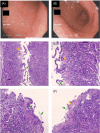Collagenous gastritis with elevated fecal calprotectin in a pediatric patient
- PMID: 38756119
- PMCID: PMC11093908
- DOI: 10.1002/jpr3.12055
Collagenous gastritis with elevated fecal calprotectin in a pediatric patient
Abstract
Collagenous gastritis is a rare and chronic inflammatory condition of undetermined etiology characterized histologically by thickened subepithelial collagen bands and increased intraepithelial lymphocytes. Here, we present a collagenous gastritis case in a 16-year-old female with chronic abdominal pain, persistently elevated fecal calprotectin (507 and 796 mcg/g), and resolved iron deficiency anemia. The patient's history, laboratory tests, endoscopy, and magnetic resonance imaging ruled out common causes of elevated fecal calprotectin, including Helicobacter pylori and gastrointestinal infections, medications, celiac disease, and inflammatory bowel disease, as well as less common causes such as collagenous colitis. Esophagogastroduodenoscopy revealed significant antral nodularity. Gastric biopsies showed thickened subepithelial collagen band and surface epithelium damage with increased intraepithelial lymphocytes. The ileocolonoscopy was normal. This is among the first reported cases of collagenous gastritis with elevated fecal calprotectin levels that could solely be attributed to this condition.
Keywords: adolescent; case report; chronic abdominal pain; endoscopy; subepithelial collagen bands.
© 2024 The Authors. JPGN Reports published by Wiley Periodicals LLC on behalf of The European Society for Pediatric Gastroenterology, Hepatology, and Nutrition and the North American Society for Pediatric Gastroenterology, Hepatology, and Nutrition.
Conflict of interest statement
The authors declare no conflict of interest.
Figures


Similar articles
-
Collagenous Gastritis: An Atypical Presentation of a Rare Disease.Cureus. 2023 Feb 6;15(2):e34698. doi: 10.7759/cureus.34698. eCollection 2023 Feb. Cureus. 2023. PMID: 36909030 Free PMC article.
-
Collagenous gastritis: histopathologic features and association with other gastrointestinal diseases.Am J Surg Pathol. 2009 May;33(5):788-98. doi: 10.1097/PAS.0b013e318196a67f. Am J Surg Pathol. 2009. PMID: 19295410
-
Collagenous gastritis: a case report, morphologic evaluation, and review.Mod Pathol. 2000 May;13(5):591-6. doi: 10.1038/modpathol.3880101. Mod Pathol. 2000. PMID: 10824933 Review.
-
Collagenous gastritis: a morphologic and immunohistochemical study of 40 patients.Mod Pathol. 2015 Apr;28(4):533-44. doi: 10.1038/modpathol.2014.119. Epub 2014 Sep 19. Mod Pathol. 2015. PMID: 25234289
-
Collagenous gastritis: a case report and review.Eur J Pediatr. 2007 Aug;166(8):769-73. doi: 10.1007/s00431-007-0450-y. Epub 2007 Apr 24. Eur J Pediatr. 2007. PMID: 17453238 Review.
References
-
- Genta RM, Turner KO, Morgan CJ, Sonnenberg A. Collagenous gastritis: epidemiology and clinical associations. Dig Liver Dis. 2021;53(9):1136‐1140. - PubMed
-
- D'Angelo F, Felley C, Frossard JL. Calprotectin in daily practice: where do we stand in 2017? Digestion. 2017;95(4):293‐301. - PubMed
-
- Klingberg E, Carlsten H, Hilme E, Hedberg M, Forsblad‐d'Elia H. Calprotectin in ankylosing spondylitis—frequently elevated in feces, but normal in serum. Scand J Gastroenterol. 2012;47(4):435‐444. - PubMed
-
- Lundgren D, Eklöf V, Palmqvist R, Hultdin J, Karling P. Proton pump inhibitor use is associated with elevated faecal calprotectin levels. A cross‐sectional study on subjects referred for colonoscopy. Scand J Gastroenterol. 2019;54(2):152‐157. - PubMed

